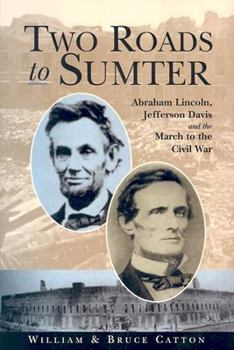Two Roads to Sumter: Abraham Lincoln, Jefferson Davis and the March to Civil War
Select Format
Select Condition 
Book Overview
This is the tragic story of the North and South as they begin their long, heartbreaking march to Civil War. Using the early lives and careers of Abraham Lincoln and Jefferson Davis as theme and... This description may be from another edition of this product.
Format:Hardcover
Language:English
ISBN:078581597X
ISBN13:9780785815976
Release Date:January 2003
Publisher:Castle Books
Length:285 Pages
Weight:1.44 lbs.
Dimensions:1.2" x 6.4" x 9.1"
Customer Reviews
1 rating
Lincoln and Davis - A Brilliant Study In Contrasts
Published by Thriftbooks.com User , 19 years ago
By the Grand Master of American Historians, the late Bruce Catton and his son William. In "Two Roads to Sumter" the Cattons brilliantly analyze how the Kentucky roots of both Abraham Lincoln and Jefferson Davis molded their character and their Allegiance to the Union, but also why those two great men chose to walk down different roads in the quest of keeping the United States united. Always thought of as a kind, gentle man - which he indeed was, Lincoln nonetheless emerges from the Catton work as someone in the Sam Waterston (himself a Lincoln admirer of great standing) lawyer role on "Law and Order" - passionate, yet a pragmatist - and someone who was willing to compromise as he was to stand firm on principle. Lincoln detested Slavery, and was willing to do all he could to preserve the Union - but he chose to be pragmatic in those crucial, fatal months between the outcome of the 1860 election and the firing on Fort Sumter - staying quiet up to the inauguration, and appearing to be uncertain in those last two months before Beauregard gave the order to open fire. David Detzer in "Allegiance" has criticized the great man for this approach, submitting to the reader that a Jacksonian approach to the South might have prevented war. But - it might have forced the "war hawks" hands much sooner, and that point is well taken by the Cattons. Their premise is that the South was ready and willing to go to war - and might have felt that way from the Kansas-Nebraska Act on. Unlike Detzer, the Cattons applaud Lincoln for staying the course, and being the brave and true man he was. By contrast Jefferson Davis - who was described by Sam Houston as being as "ambitious as Lucifer" - and with his pointed beard even bore a sad resemblance to him, comes off better than he has at the hands of other historians. The Cattons were among the first to show that while Davis was uncompromising in his views on Slavery and state's rights, he was a fervent believer in the Union who unlike Lincoln had actually shed blood in battle for this nation. They describe his outstanding tenure as Secretary of War in Franklin Pierce's administration; his role in the Gadsen Purchase, in establishing the Camel Corps, in urging the building of railroads across the country. In all this Davis took the high road of country first, region second, even if he was also bettering the South. When push came to shove however, Lincoln chose the Union, while Davis eventually became an uncompromising acolyte of secession and the south as a separate entity, even if his initial decision to leave the U.S. Senate and declare for a Confederacy was a reluctant one. An immensely readable history of the story of two Americans - Lincoln and Davis, and the events leading up to the Civil War. To be placed alongside the three great titles on Secession and Fort Sumter - Detzer's "Allegiance"; Swanberg's "First Blood", and Klein's "Days of Defiance".






